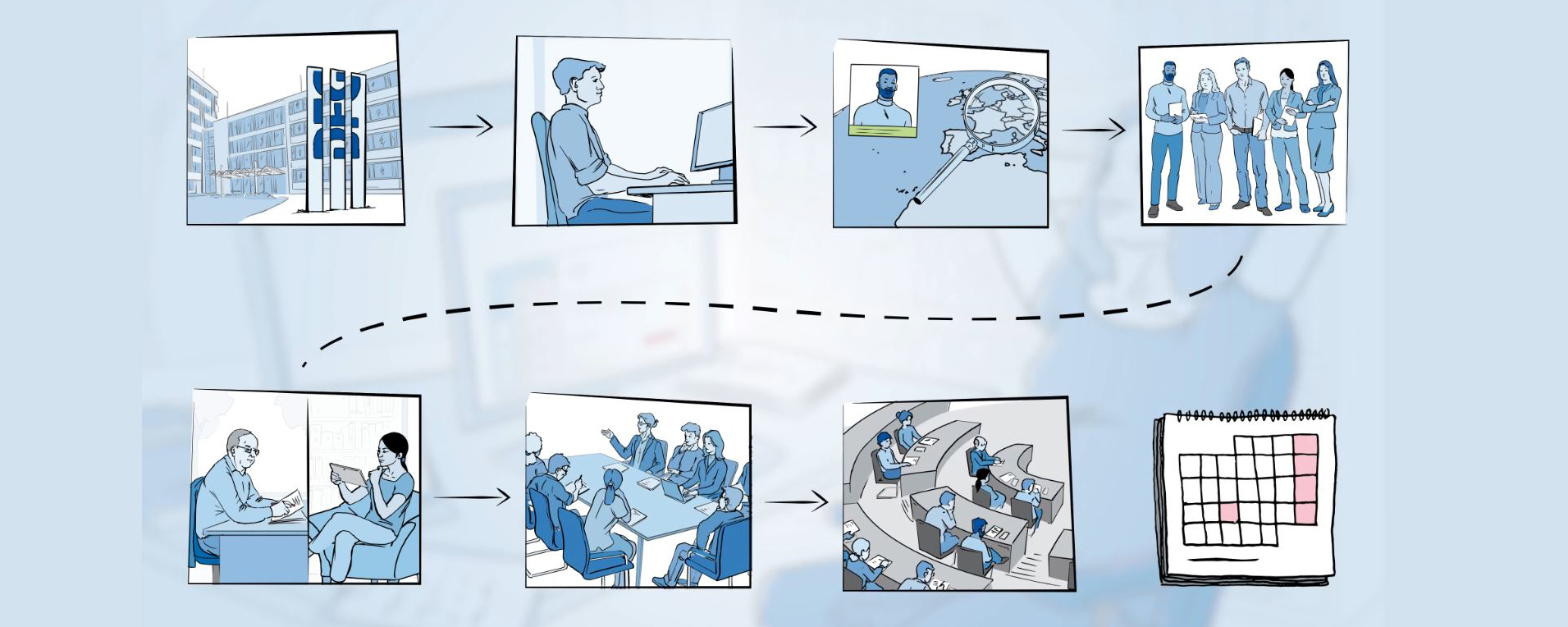Proposal submission, subject area allocation and interdisciplinarity
Funding proposals to the DFG are to be allocated to subject areas for review, evaluation and decision. Read here how this happens, what classification system is to be used, and how the handling of interdisciplinary proposals is organised:
Individual proposals

How should individual proposals be allocated to the DFG subject areas?
Anyone submitting an individual proposal via ela(externer Link) is requested to make a primary subject area allocation. All of the subject areas contained in the DFG subject area structur(Download) are available for selection. Those submitting proposals can also optionally specify (one or more) other subject areas. This specification should outline the discipline-specific or interdisciplinary context of the research project. Those submitting proposals can make a corresponding reference in the covering letter if there is no subject area that fully describes the proposal.
For every subject area, you can contact a specific perso(interner Link) at the DFG Head Office. Once the proposal has been received, the person who is primarily responsible for the subject area will, as necessary, review the subject area allocation together with others concerned to then initiate a multidisciplinary review and evaluation process. The subject area allocation is decisive in ensuring that a proposal can be reviewed and evaluated in comparison with other proposals that have as similar a thematic, theoretical and methodological propensity as possible.
How is the review process organised?
For all research proposals, the DFG Head Office selects reviewers who are researchers that have been individually designated according to their thematic, theoretical and methodological suitability. This selection is irrespective of subject area boundaries and also involves multiple research areas at the DFG Head Office. In order to cover multiple disciplines or an interdisciplinary approach, several research areas at the DFG Head Office coordinate with each other. In the case of interdisciplinary proposals, those responsible ensure that the reviewers and evaluators of such proposals have the required experience with interdisciplinary research.
Which statutory bodies evaluate proposals?
The allocated review boar(interner Link), expert forum or sectio(interner Link) assumes responsibility for evaluation of the reviewed proposals. In each case, these statutory bodies – depending on the requirements of the scientific disciplines – cover multiple fields of work, disciplines or subdisciplines; they therefore guarantee a multidisciplinary comparative perspective. Should the substantive design of a proposal be so inter- or multidisciplinary that a review board, an expert forum or a section cannot cover it, then members of other review boards are co-opted into the evaluation, or the proposal is managed across several review boards.
How does the DFG ensure comparability among interdisciplinary proposals?
The DFG subject area structure is a guiding framework, not a rigid blueprint. Research proposals frequently cross the boundaries of subject areas, review boards or research areas. Our DFG procedures allow adequate flexibility to ensure optimal organisation of the review and evaluation of individual proposals. Reviewers from several subject areas can be selected, several review boards can be involved, and review panels can be composed in an interdisciplinarity manner to suit the proposals.
The guiding principle is that each proposal be evaluated together with as many comparable proposals as possible to ensure fair competition. The DFG therefore distributes the funding budget in such a way that all proposals in all subject areas or technical contexts have equal funding opportunities. In other words, the opportunity of receiving funding is not dependent on the review board to which it is allocated, for example.
A video clip showing the path a proposal follows towards decision

A video clip showing the path a proposal follows towards decision
By clicking on "Play" you agree that data will be transmitted to Google. For further information on data processing by Google, please refer to Google's privacy polic(externer Link). Information on processing by DFG and your right to revoke your declaration of consent can be found in our Privacy Polic(interner Link).
How are proposals relating to the coordinated programmes allocated to subject areas?

The DFG’s coordinated programmes include:
- Research Training Group(interner Link)
- Research Unit(interner Link)
- Collaborative Research Centre(interner Link)
Consideration of the often multidisciplinary approaches of research associations results in proposals relating to the DFG’s coordinated programmes not being allocated to an individual subject area, but rather to a review board (Research Training Groups) or a research area (Research Units, Collaborative Research Centres). Those individuals or institutions submitting proposals can suggest these allocations themselves at the time of proposal submission. Here too, those submitting proposals can in each case specify further, secondary allocations. This provides the discipline-specific or interdisciplinary framework within which a proposal will be managed. If a proposal were to be allocated to a primary review board at the draft proposal or initial stage relating to a coordinated programme, this would be adopted for the proposal phase.
How is the selection process organised at the draft proposal stage?
Those submitting proposals relating to the above-mentioned coordinated programmes initially present a draft proposal in the first stage of the evaluation process. The reviewers evaluate these in writing in the case of Research Units and Research Training Groups; for Collaborative Research Centres there is a consultation.
The affected DFG research areas coordinate with each other to ensure that the professional composition of the reviewers or the consultation group reflects the configuration of those submitting the proposals. The competent persons select the reviewers for each individual draft proposal according to their thematic, theoretical and methodological suitability to cover the disciplinary or interdisciplinary propensity as precisely as possible.
In the case of a written review, the evaluation is conducted by the allocated review board, expert forum or section. Equivalent to an individual grant, the DFG checks the allocation to a review board and involves further review boards as necessary to meet the interdisciplinary nature of a proposal.
The Senate or the Senate Committee on Research Training Groups or Collaborative Research Centres, respectively, decides whether or not applicants are invited to submit a proposal.
How is the review process organised at the proposal stage?
For the review of each proposal under a coordinated programme, the DFG Head Office assembles an individual review panel. This prevents any confinement to specific subject areas or research areas.
The decision on funding a proposal is ultimately made by the Joint Committee or the respective Grants Committe(interner Link). These statutory bodies are broadly interdisciplinary and all scientific disciplines are represented. There is continuous assurance in the reporting by these statutory bodies that the proposal is viewed from both a subject-related and a non-subject-related perspective.
Details on each coordinated programme as well as the respective decision-making process can be found on the programme page(interner Link).